GREEN CAMPUS
RIT campus is designed eco-friendly and landscaped with extensive gardens, Plantation. The entire campus is maintained as no-smoking zone. The significant initiatives implemented are:
Energy Conservation
RIT commit to install environment friendly electrical appliances that save energy and reduce wasteful inefficiencies by adopting energy efficient light like LEDs, low energy fixtures, energy efficient pumping system, energy efficient motors and also adopting solar street lights in the college campus, solar focus light in the hostel campus, solar water heater for hostel blocks & other equipment, etc.

Water Conservation
Rainwater Harvesting & Recharging of ground water and collection and utilization are implemented in the RIT campus has been carried out in phases which utilised as water conservation energy
Phase-I: Collection of rain water harvesting from the roof top of Main block and taken to scientifically planned series of ground water recharging pits to augment the ground water level and also for the landscaping works
Phase-II: Recharging of existing bore well using gravity head recharge settling tank with using rain water runoff from the roof tops of RIT Boys hostel.
Phase-III: Runoff water is collected and diverted into ground infiltration pit near administrative block at RIT Campus.
Phase-IV: Runoff water is collected and diverted into ground infiltration pit near main stage of at RIT Campus.
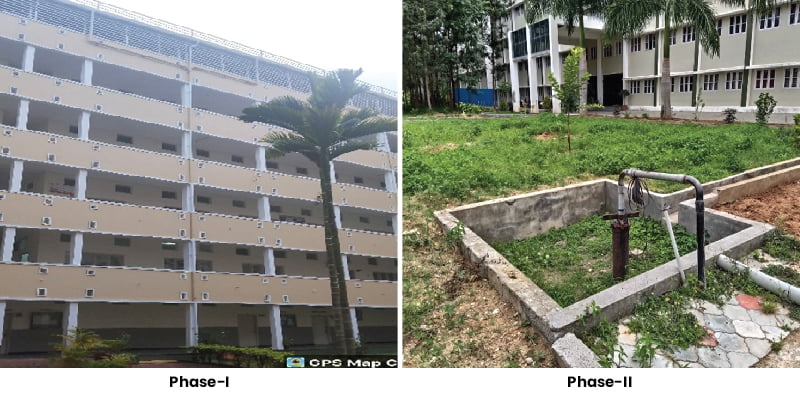
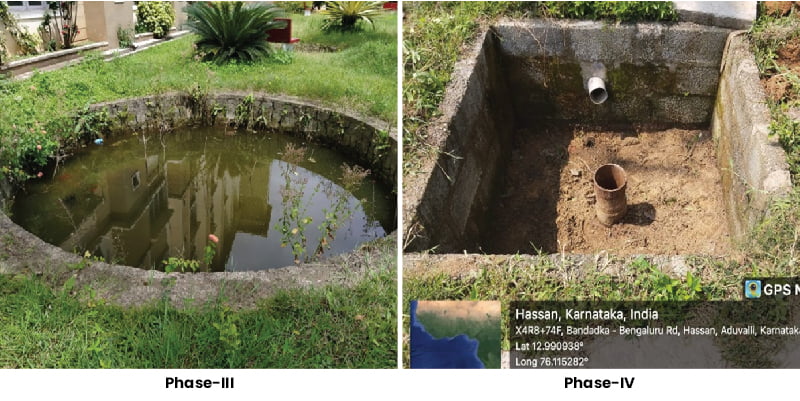
Solid Waste Management
The institution has implemented Two – bin system in all the buildings, one for collecting degradable and the other for non-degradable waste. Institution provides food for all the students and faculty members- breakfast, tea and snacks, lunch and inclusive of dinner for hostel residents. This leads to enormous amount of food waste and vegetable waste. In addition, other solid wastes include paper, cardboard, garden debris etc. The waste is collected every day and is transported to sanitary landfill site of the institution every day. The composted waste is used for gardening and agriculture.
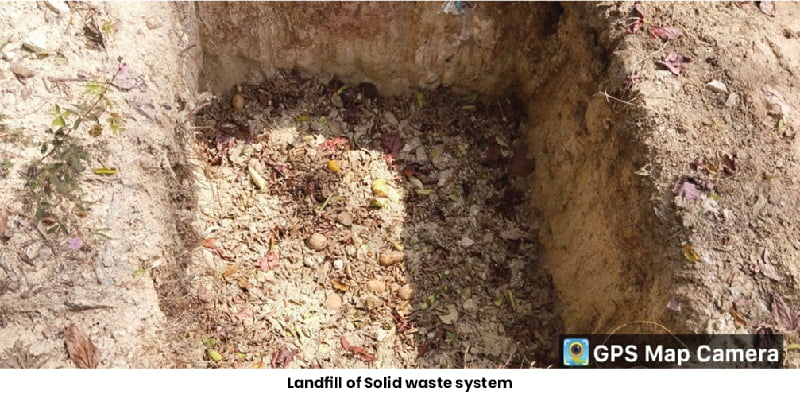
Two-bin system is installed in the campus for collecting degradable and non-bio-degradable wastes. Same will dumped to sanitary landfill which is located behind the RIT boys’ hostel at the RIT Campus.
Metal waste from the workshop is stored and given to authorized scrap agents for further processing.
Liquid Waste (Sewage treatment plant)
Sewage treatment is the process of removing contaminants from wastewater generated from toilets from hostel containing mainly, Physical, chemical, and biological processes are used to remove contaminants and produce treated wastewater (or treated effluent) that is safe enough for release into the environment. At Rajeev Institute of technology, a STP (Sewage Treatment Plant) of 10 lakh MLD capacity has been set up near the girl’s hostel, the waste water generated within the campus of RIT has been collected and treated with treatment processes such as Screening, Aeration, Sedimentation, Filtration and chlorination. The treated effluent is taken to compost pit and been used for gardening in the college campus and also treated water is used for gardening, vehicle washing & flushing of toilets in the Hostel.
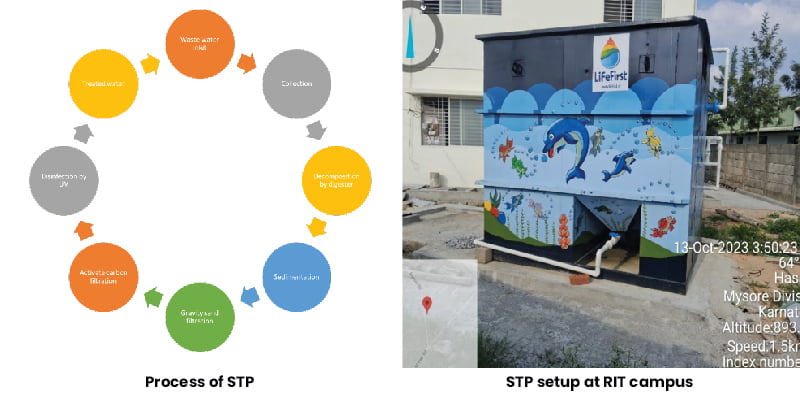
E- Waste Management
E-waste or Electronic waste describes discarded electrical or electronic devices. E-waste typically includes discarded computer monitors, motherboards, Cathode Ray tubes (CRT), Printed Circuit Board (PCB), mobile phones and chargers, compact discs, headphones, white goods such as Liquid Crystal Displays (LCD)/ Plasma televisions, air conditioners, refrigerators and so on. Following are some of the measures adopted in college with regard to E-waste management.
- Re-evaluate. Try to avoid an extra gadget with finding one device with multiple functions.
- Extend the life of your electronics. Keeping the device well maintained will extend the life thereby avoiding procurement of new one.
- Buy environmentally friendly electronics. Look for products labelled Energy Efficient labelled by Bureau of Energy Efficient.
- Donate used electronics to social programs—outdated and obsolete computer or any other electronic gadget are donated to social programs.
- E- Bins: To manage e-waste, e-bin is installed which will be collected by e-waste recycler or e-waste disposer.
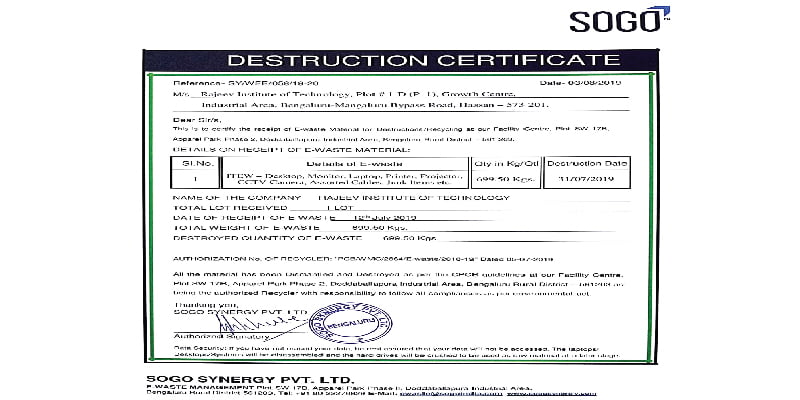
Environment Awareness to students & public
Campus cleaning day is followed periodically with about 1483 students participating as part of awareness creation both within the campus and nearby villages.
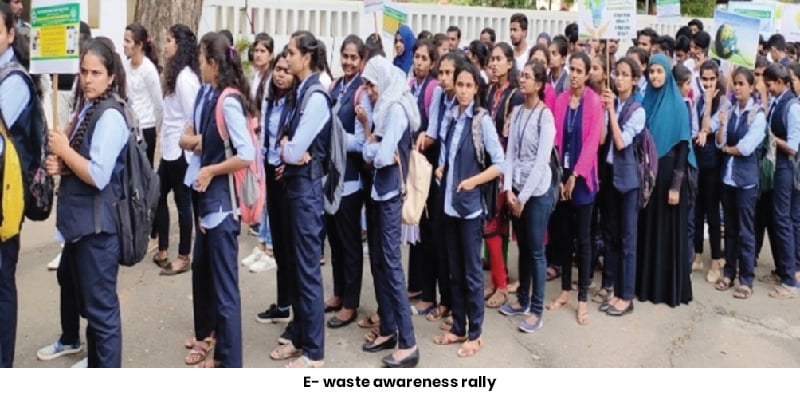
Eco-friendly transportation
Bicycle is the best eco-friendly option for transportation which is used in RIT Campus as a cost- effective and more practical compared to others, pathway of the RIT campus comes around 2KM, therefore inside the campus bicycles are used as an eco-friendly transportation.

No-Smoking Zone
The entire campus is maintained as no-smoking zone


